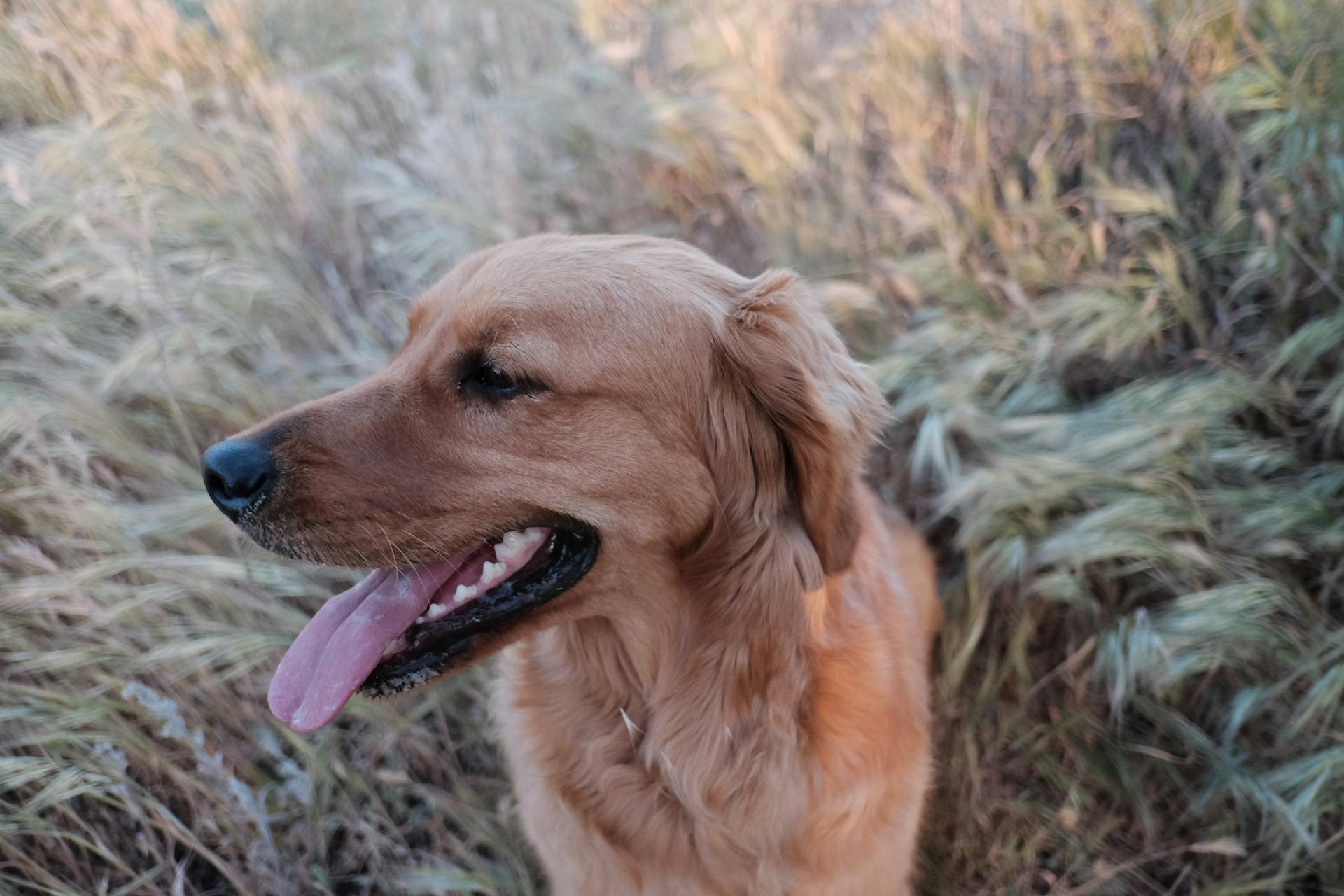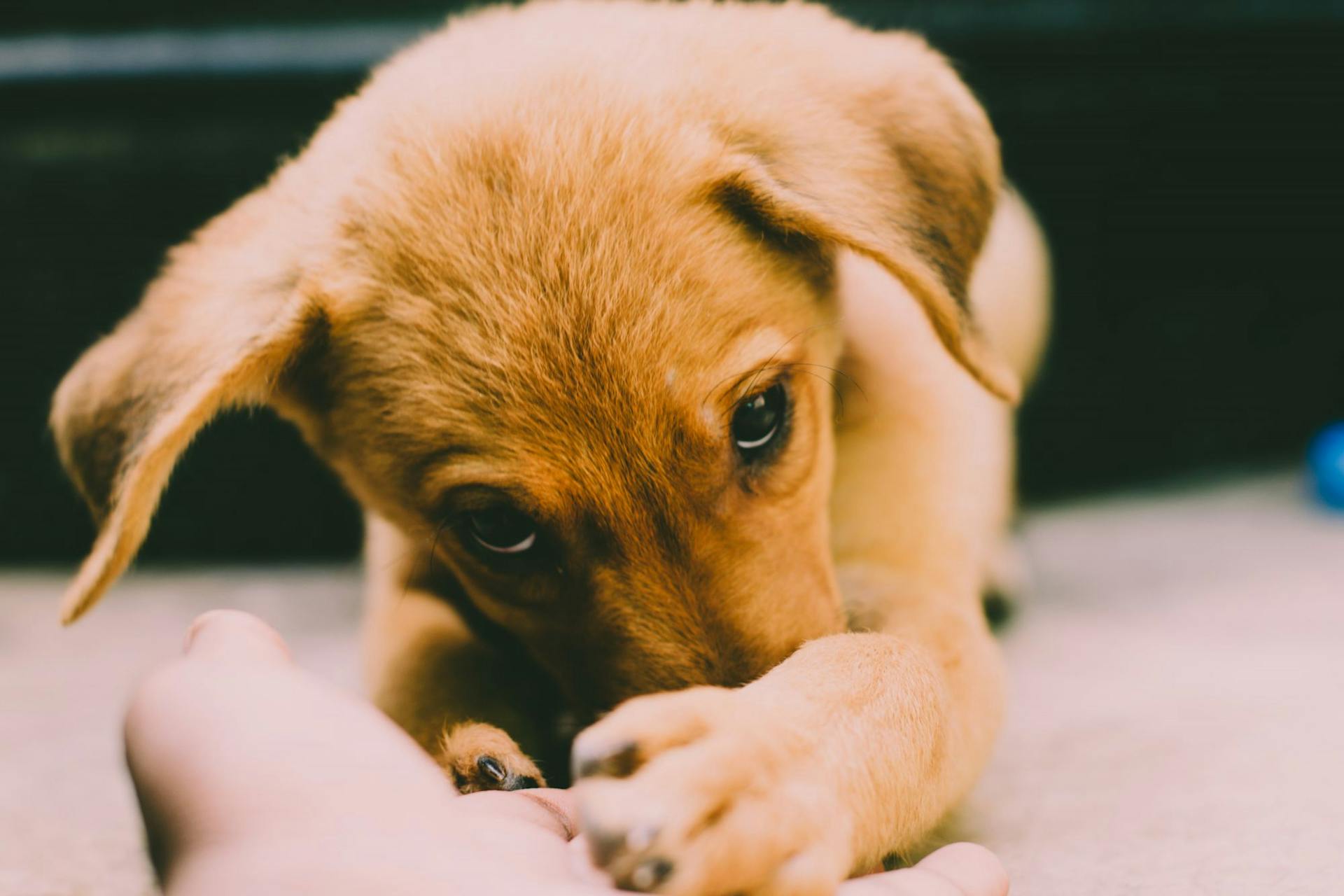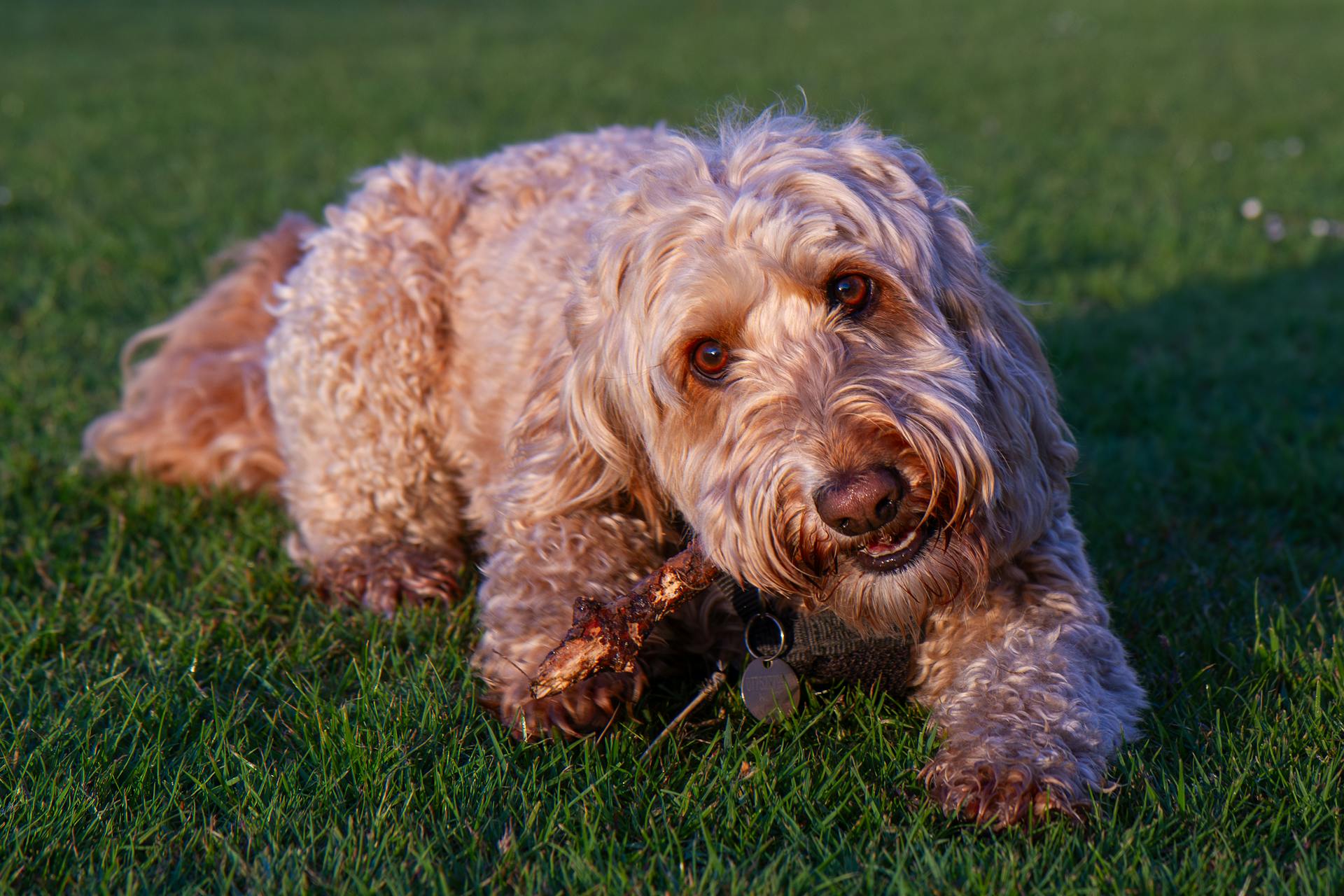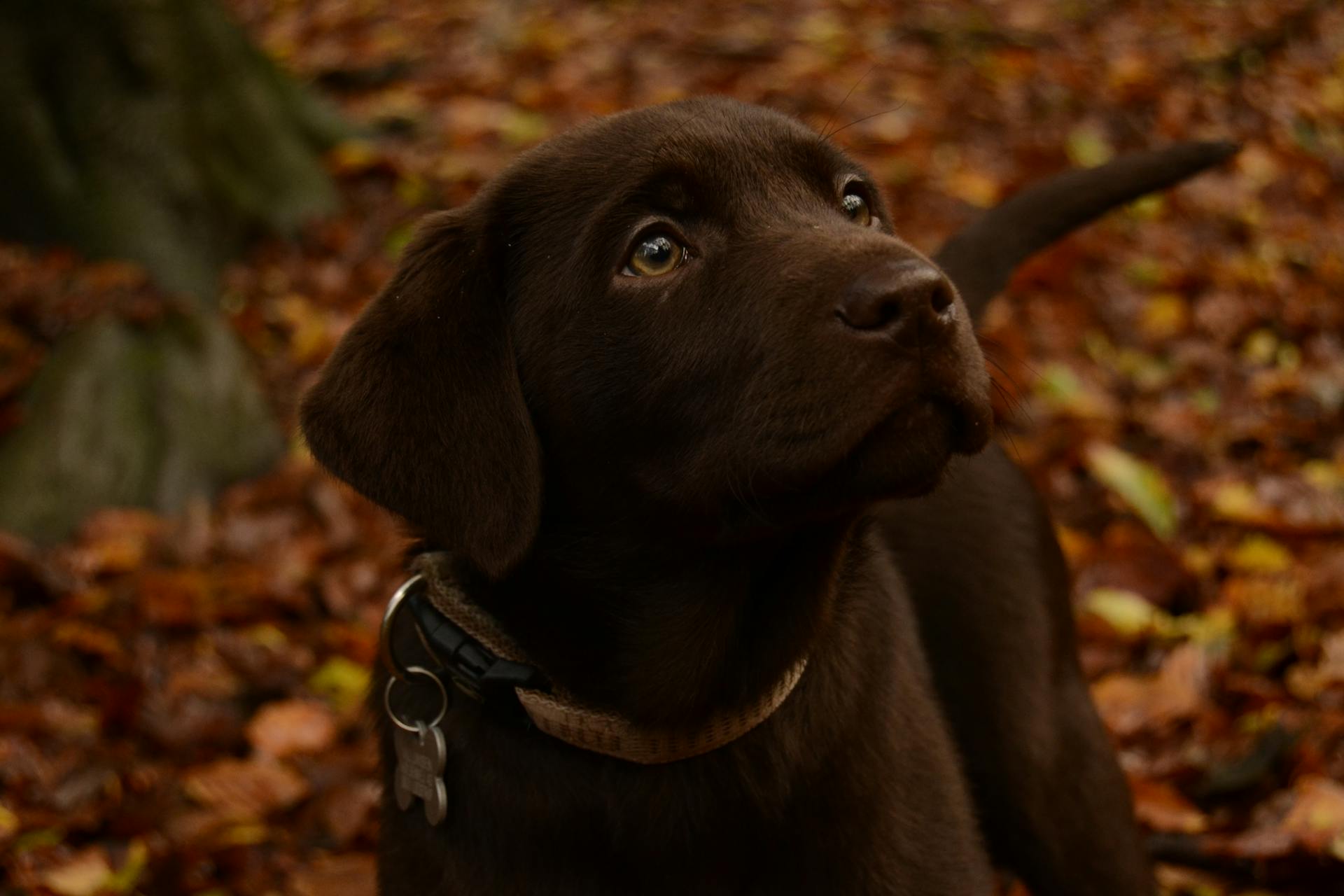
Brown Goldendoodles are a cross between a Golden Retriever and a Standard Poodle, resulting in a friendly, intelligent, and adaptable breed.
Their coats can vary from a light golden brown to a dark chocolate brown, with some having a distinctive mahogany tint.
Brown Goldendoodles are generally great with children, making them an excellent choice for families.
Here's an interesting read: Golden Brown Labrador
Colors and Patterns
Brown Goldendoodles are a delight to behold, and their colors can vary depending on their Poodle ancestry. Their coats can range from a rich, deep brown to a lighter, more golden brown.
The rarest Goldendoodle color is often considered to be the true red or the parti-color, which is a combination of two different colors. Brown Goldendoodles, on the other hand, are relatively common and can make for a lovely family pet.
Goldendoodles can change color as they age, and it's common for their coats to get lighter. This means that a puppy that's born a darker shade may lighten as it grows older.
Brown Goldendoodles have a unique charm to them, and their coats can range from tight curls to loose waves. Whether you're looking for a classic shade or something more unique, there's a Goldendoodle color that's sure to capture your heart.
Here are some common colors found in Goldendoodles:
- Teddy bear apricot
- Brown
- Cream
- Red
Some Goldendoodles even have a brindle pattern, which gives their coat an almost tiger-stripe look. This is a rare pattern that's a result of a recessive gene, and each Brindle Goldendoodle has a unique color and pattern variation.
Health and Care
Brown goldendoodles are generally a healthy breed, but like all dogs, they can be prone to certain health issues. One of the most common is patellar luxation, a condition where the kneecap slips out of place.
Regular veterinary check-ups are essential to catch any potential problems early on. Your vet may recommend a blood test, X-rays, eye examination, blood chemistry, and DNA testing for Von Willebrand's Disease (VWD) to ensure your brown goldendoodle stays healthy.
To keep your brown goldendoodle's ears healthy, clean them regularly, especially after water-related activities or baths. This will help prevent ear infections that can be painful and annoying for your dog.
Health Risks

Goldendoodles can inherit genetic conditions from their parents, just like any other dog breed. If both parents carry the necessary genes, the condition can still develop even if they're from different breeds.
Some health conditions that Goldendoodles may be prone to include Patellar Luxation, Elbow Dysplasia, and Hip Dysplasia. These conditions can be detected through X-Rays and other health screenings.
Reputable breeders should carry out health screenings and be transparent about the results. Parents should only deal with breeders who provide this level of care.
In the USA, the Goldendoodle Association of North America offers a list of trusted breeders and the opportunity to register your own dog. This can help further the pedigree of Goldendoodles.
Here are some common health conditions that affect Goldendoodles:
To ensure your Goldendoodle stays healthy, it's essential to be aware of these potential health risks and work with a responsible breeder who prioritizes health screenings.
Puppy Care
To keep your Goldendoodle happy and healthy, regular exercise is essential. A few daily walks and play sessions are enough to meet their moderate exercise needs.
Their coats, which can vary from retriever-like to poodle-esque, require regular grooming to keep them looking their best. Depending on their coat type, they might need grooming every few months.
Goldendoodles are adaptable and can thrive in a variety of settings, from urban apartments to expansive farms.
Ear Care

Goldendoodles are prone to ear infections due to their affinity for water, so it's essential to clean their ears after water-related activities or baths to prevent issues.
Regular ear cleaning can help reduce the risk of infections, which can be painful and uncomfortable for your furry friend.
After a bath or swim, gently wipe the outer ear with a damp cloth to remove dirt and debris.
Consider reading: Ear Infections in Goldendoodles
Diet and Nutrition
Brown Goldendoodles have a unique diet requirement due to their varying sizes, ranging from Mini to Standard.
Their weight and activity level play a significant role in determining how much to feed them.
Golden Retrievers, a parent breed of the Goldendoodle, are notorious for being greedy, so it's essential to monitor their food intake to avoid overfeeding.
The quality of their food is equally important, and choosing a high-quality meal will have a significant impact on their health.
You can consult with your vet for personalized advice on weight management, especially if your Brown Goldendoodle has inherited the Golden Retriever's greedy trait.
A list of the best meals for a Goldendoodle is available through our partner, Dog Food Advisor.
Curious to learn more? Check out: Good Food for Goldendoodles
Temperament and Training
Brown Goldendoodles are friendly dogs, whether they're with children, strangers, or other dogs, but they do require effective socialization during puppy years.
Their temperament is often described as a "work-in-progress" because hybrid dogs like Goldendoodles are still relatively new, making it hard to pinpoint exact behavioral traits.
With their quick learning and eagerness to please, Brown Goldendoodles are an excellent choice for first-time dog owners, especially when employing positive reinforcement and treat-based training methods.
These methods yield remarkable results, even with young puppies, and can help you build a strong bond with your Brown Goldendoodle.
Temperament
Goldendoodles are friendly dogs by nature, which makes them great with children and strangers, but only if they've had proper socialization during their puppy years.
They're not ideal as guard dogs, as their friendly temperament can make them too trusting of others.
Hybrid dogs like Goldendoodles are often referred to as "work-in-progresses", which means their exact behavioral traits can be hard to pinpoint since they're still a relatively new breed.
Purebred options might offer more certainty when it comes to a dog's temperament and behavior.
A fresh viewpoint: Are Goldendoodles Affectionate
Training Tips
Goldendoodles are a great choice for first-time dog owners due to their quick learning and eagerness to please.
Employing positive reinforcement and treat-based training methods is key to getting remarkable results, even with young Goldendoodle puppies.
This approach helps build trust and strengthens the bond between you and your dog, making training a positive and enjoyable experience.
Goldendoodles thrive on praise and rewards, so be sure to use plenty of verbal affirmations and tasty treats to motivate them during training sessions.
With consistent and patient training, Goldendoodles can learn to obey commands, behave well in public, and become wonderful companions.
Variety for All
Goldendoodles come in three sizes: standard, medium, and miniature, making them suitable for a wide range of living situations.
The standard Goldendoodles are playful and make excellent companions for families, while the miniatures are perfect for apartment living. Medium doodles make for a perfect in between.
Depending on their Poodle lineage, Goldendoodles can vary in size, with standard ones reaching over 21 inches tall and weighing up to 100 pounds.
Goldendoodles can inherit a curly coat, Poodle-like locks, or sport a wavy coat from their Golden Retriever parent, requiring regular brushing to maintain their coats and prevent matting.
Their hypoallergenic fur is a bonus for families with allergies, but it still needs regular attention to stay healthy.
Explore further: Goldendoodle vs Standard Poodle
Exercise and Play

Brown goldendoodles, like their counterparts, require around 30 minutes of daily physical activity to stay happy and healthy. Whether you live in a small apartment or a spacious house, it's essential to provide them with regular exercise.
A fenced backyard or a nearby park can be a great place for them to run around and play. Brown goldendoodles enjoy a variety of activities, so mix it up and keep things interesting.
Puppy and Owner
Brown Goldendoodles are known for their friendly and affectionate nature, making them a great match for families with children. They are often described as gentle and patient.
Their intelligence and trainability make them relatively easy to train, especially with positive reinforcement methods. This means they can learn basic commands and behaviors quickly.
One of the benefits of owning a Brown Goldendoodle is their low-shedding coat, which requires less grooming than other breeds. They still need regular brushing to prevent matting and tangling.
Brown Goldendoodles typically weigh between 30-60 pounds and stand between 15-20 inches tall at the shoulder. Their size makes them a great fit for families who live in apartments or have limited space.
Their friendly nature means they get along well with other pets, especially if socialized from an early age. With proper training and socialization, Brown Goldendoodles can thrive in multi-pet households.
Hypoallergenic and Maintenance
Brown Goldendoodles are a popular choice for families with allergies, and one of the reasons is their hypoallergenic coat. This means they shed minimally, making them a great choice for those who suffer from allergies.
Their coats are usually long and dense, which can trap dirt and get matted, so regular grooming is necessary. Use a slicker brush a few times a week to keep their fur manageable and looking respectable. A professional trim every 8-12 weeks is also recommended.
To keep their coat from getting too long, you may need to trim the fur around their eyes, ears, footpads, and hind end yourself at home. This will help prevent irritation and keep them comfortable.
Here's a quick rundown of the grooming needs of Brown Goldendoodles:
With regular grooming and attention, your Brown Goldendoodle will be happy and healthy, and you'll be able to enjoy their companionship without worrying about allergies.
Breed Maintenance
Goldendoodles have a hypoallergenic coat, but that doesn't mean they don't need regular grooming. They require a slicker brush a few times a week to keep their long and dense coat manageable.
Their coats are prone to trapping dirt and getting matted, so regular brushing is essential. Regular grooming will also help prevent matting around the eyes, ears, footpads, and hind end.
A professional trim every 8-12 weeks is recommended, but you may need to snip fur at home in the meantime to prevent irritation. This will keep your Goldendoodle looking and feeling its best.
Goldendoodles are more suited to living in cool and temperate environments, as their thick coat can cause them to overheat. They love running, swimming, and playing games in the great outdoors, so be prepared to provide at least an hour of daily exercise.
A bit of mental stimulation is also necessary to keep their big brains occupied, which can be achieved through frequent training sessions or agility courses. This will help keep your Goldendoodle happy and engaged.
A fresh viewpoint: When Do Goldendoodles Lose Their Puppy Coat
Hypoallergenic Dogs
One of the best things about Goldendoodles is their hypoallergenic coat, which makes them a great choice for people with allergies.
Their descendants from purebred Poodle parents, known for their allergy-friendly traits, shed minimally, reducing the amount of allergens in the air.
The F1B Goldendoodle, which is 75% Standard Poodle and 25% Golden Retriever, boasts a curlier coat that's perfect for those who prefer large, non-shedding dogs.
For those with severe allergies, a F1BB Goldendoodle is an excellent option, as they result from breeding an F1B Goldendoodle with a Poodle, making them 12.5% Golden Retriever and 87.5% Poodle.
This generation is highly sought after for being mostly non-shedding, making it an ideal choice for families with severe allergies.
Here's a breakdown of the different Goldendoodle generations and their hypoallergenic properties:
Their hypoallergenic coat is just one of the many reasons why Goldendoodles make great pets.
Frequently Asked Questions
How much is a brown doodle?
The cost of a brown doodle can range from $2,000 to $4,000, depending on factors like breeder reputation and size. Adoption costs can be significantly lower, typically between $100 to $300.
What color is the most expensive Goldendoodle?
The most expensive Goldendoodles have rare, multi-colored coats, including Phantom, Tri, Sable, Merle, and Parti. These unique colors can increase the purchase price by $500-$1000.
Sources
- https://www.thesprucepets.com/goldendoodle-dogs-and-puppies-4169955
- https://www.dogster.com/lifestyle/types-of-goldendoodle-colors-and-patterns
- https://wagwalking.com/breed/goldendoodle
- https://www.knudawnsoutherngoldendoodles.com/goldendoodle-colors
- https://www.doodlesofnc.com/single-post/is-a-goldendoodle-right-for-you
Featured Images: pexels.com


